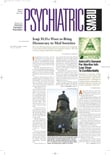A drug long used to combat alcohol addiction may also be effective in helping to decrease cocaine use in cocaine-dependent people, according to the results of a new study. Combining the medication with cognitive-behavioral therapy (CBT) appeared to strengthen the effect of the medication by decreasing cocaine use even further.
For years, disulfiram (Antabuse) has been used to treat alcohol dependence by creating unpleasant physical effects such as nausea, vomiting, and headache in those who ingest alcohol. But when researchers from Yale University tested it against placebo in cocaine-dependent subjects, those who took disulfiram reduced their cocaine use significantly more than those who received placebo.
CBT further boosted the effects of the disulfiram in the cocaine-dependent subjects. The findings appeared in the March Archives of General Psychiatry.
“We think our findings are exciting because disulfiram is the first medication to emerge from randomized double-blind trials as an effective treatment for cocaine dependence,” lead Investigator Kathleen Carroll, Ph.D., told Psychiatric News. “Moreover, our findings highlight the importance of structured behavioral therapies such as CBT, which has been shown in our trials and those by others to have highly durable results in our cocaine users.”
Carroll, a professor of psychiatry at Yale University School of Medicine, and her colleagues recruited cocaine-dependent subjects from the APT Foundation, a nonprofit, outpatient substance-abuse treatment center in New Haven, Conn., and newspaper ads.
To be included in the study, subjects had to meet DSM-IV criteria for current cocaine dependence. Those who were dependent on opiates or barbiturates, were previously diagnosed with bipolar disorder or a psychotic disorder, or expressed suicidal or homicidal ideation were excluded from the study.
Researchers assigned the eligible 121 subjects to one of four groups: treatment with 250 mg of disulfiram per day plus CBT, disulfiram plus interpersonal therapy (IPT), placebo plus CBT, or placebo plus IPT. Therapy was provided once a week.
They assessed the subjects before treatment, each week during the 12-week trial, and after the trial for self-reported cocaine use, alcohol use, and treatment compliance.
Urine toxicology screens were used to verify the subjects’ reports.
During the course of the study, nine people failed to begin treatment, and 58 people dropped out before completing the 12-week experimental trial, leaving 53 people who finished the study.
Carroll and her colleagues found that after the 12-week treatment trial, those who took disulfiram reduced their cocaine use significantly more than those who received placebo, and those who received CBT reduced cocaine use significantly more than those who received IPT during the treatment sessions.
Carroll calculated an effect size of .35 for CBT over IPT and an effect size of .30 for disulfiram over placebo, which is consistent with a “moderate or small effect,” she said.
An effect size measures the average effect of an experimental treatment over that of a control treatment on a group of subjects (Psychiatric News, July 4, 2003). Researchers calculate effect size in order to determine the extent to which the ranges of scores of the two groups overlap.
Carroll and her team also found that the effects of the disulfiram were most pronounced in those who abstained from alcohol during the trial.
The report noted that “alcoholic participants who drank while taking disulfiram” noticed that the disulfiram made them feel ill and “were somewhat less likely to be compliant and seemed unable to refrain from continued alcohol use.”
With the knowledge that cocaine-dependent people have high rates of alcohol abuse, Carroll said her original rationale in using disulfiram in the study was to reduce drinking among cocaine users. Alcohol is a strong cue for cocaine use and can impair judgment and lower resistance to urges to use cocaine, so Carroll hypothesized that targeting alcohol use in cocaine-dependent outpatients would in turn decrease cocaine use.
“While helping cocaine users to stop using alcohol remains an important strategy, the direct effects of disulfiram on cocaine use are very intriguing,” she said.
Carroll would like to follow up on the results of this study by evaluating the mechanism by which disulfiram works to reduce cocaine use.
“Currently, we’re looking into disulfiram’s effects on dopamine beta hydroxylase as one possible mechanism,” she said. “It will also be important to explore ways of maximizing treatment outcome, for instance, by using different behavioral therapies to facilitate compliance with disulfiram.”
The National Institute on Drug Abuse funded the study.
An abstract of the study, “Efficacy of Dilsulfiram and Cognitive Behavior Therapy in Cocaine-Dependent Outpatients,” is posted online at www.archgenpsychiatry.com. ▪
